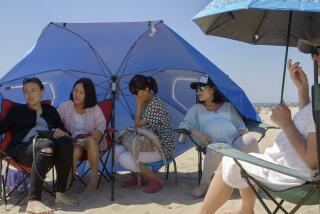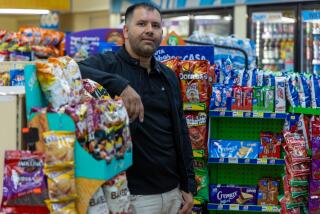From Romania, With Love : Camarillo: With immigration nightmare behind them, a couple will spend this Mother’s Day at home with their adopted child.
- Share via
On Mother’s Day a year ago and a world away, George and Shirley Suffren of Camarillo were stranded in Romania with almost no food or formula for their sick adopted infant, mired in an immigration nightmare.
The middle-aged couple--he an engineer and she a school teacher--poached an egg, made toast over a gas stove and ate their Mother’s Day meal in discouraged silence within the damp walls of an ancient brick apartment.
Today’s Mother’s Day will be different, as disparate as the overwhelming poverty of the tiny town where their child was born and the relative affluence of her new home in Camarillo.
Alyssa, the adopted daughter they rescued from a state hospital where she had been bound in blankets with hands at her sides to minimize the care she needed, is now a healthy, chattering toddler of 19 months.
Her pediatrician calls her progress astounding.
She and her doting siblings, 21-year-old Ken, now engaged to be married, and 18-year-old Becky, a high school senior, will surround their mother at a family celebration.
“We may just have toast and egg again in memory of what we went through over there,” said George Suffren, only half in jest. “It’s something we’ll never forget.”
“We just couldn’t believe the way we were being treated by our own government,” Shirley Suffren said. “One lady at the American Embassy there told us to take our babies and get out. There was no sympathy whatsoever.”
The saga began after the Suffrens watched a television show on the plight of infants abandoned to orphanages in Romania. The Suffrens began adoption procedures through the Ventura office of Adoption Services International.
The local agency helped them through the police record checks, the home study and other documents needed before a couple can be cleared for foreign adoption.
Shirley Suffren arrived in the tiny town of Tigru Mures in the mountains of Transylvania in Romania on April 1, 1991, and expected to be in the country for two weeks to complete the adoption through Romanian courts and secure the necessary immigration papers from the United States.
The process had been completed hundreds of times before. In fact, from 1981 to 1991, 2,552 Romanian babies were adopted and brought to the United States, said Sandra Browne, executive director of Adoption Services International.
Through a lawyer, the Suffrens learned about Alyssa. Her mother and father, poor farmers with six other children, had taken the child to the state hospital when she was 10 days old and had not seen her in seven months, Shirley Suffren said.
The baby’s natural mother was unable to feed her, Shirley Suffren said. “She was malnourished herself and I guess she didn’t have any milk,” she said.
At 7 months old, lying in the hospital bed, the baby refused to make eye contact.
Doctors said she was malnourished with a distended stomach and had a cold. Her legs, which had been bound since she arrived at the hospital, were atrophied from disuse.
“Her little legs were like two noodles,” Shirley Suffren said.
Suffren and her lawyer contacted the parents. Her natural mother wept at the sight of her child. The two parents agreed to the adoption and the court approved it. Shirley Suffren had already begun all the prescribed actions required to secure immigration approvals to bring the child home.
But on April 14, CBS’s “60 Minutes” aired a program depicting baby-selling on the black market in Romania. After that, the Suffrens said, the Immigration and Naturalization Service cracked down on adoptions of babies with living parents. The planned two-week trip over Easter vacation from her teaching job was stretching into several weeks.
There was no formula available for sale in the stores and very little food for the adults.
“I asked one INS man what was I supposed to do,” Shirley Suffren said. “Alyssa was legally mine and I couldn’t return her to a Romanian hospital if I wanted to. He told me, ‘That’s your problem.’ ”
Meanwhile, George Suffren had come to join his wife in Romania.
But money was running out. The adoption was supposed to cost $8,000 to $10,000, but the total cost of their adoption effort was actually approaching $20,000. The Suffrens took a second mortgage on their home so they could stay in Romania longer than planned.
Then came the phone call from George Suffren’s employer.
“When I left for Romania, they said, ‘Don’t worry, go take care of your wife and baby,’ ” said Suffren, a soft-spoken man of 46. “Then, while I was stuck over there, they fired me, from 10,000 miles away.”
In desperation, the Suffrens contacted Rep. Elton Gallegly (R-Simi Valley), who took on the cause with the tenacity needed to get the job done.
“He stayed with it until he got the answers he wanted,” George Suffren said.
Gallegly spent hours on the telephone trying to get action from the INS and the State Department. When he got no results, he went to the White House. Then Chief of Staff John Sununu intervened with the INS. Soon afterward, the Suffrens and about 50 other couples were granted permission to bring their infants home.
“A lot of times people call and ask you to do something that is outside the law,” Gallegly said. “The Suffrens had complied with the law. It wasn’t until INS changed the rules at halftime that I got involved.”
Two years from the date of entry to the United States--on May 23, 1993--the Suffrens can apply for a visa and then permanent citizenship for Alyssa.
Elton is one of the few clearly discernible words in Alyssa’s growing vocabulary. The Suffrens’ foyer wall boasts a portrait of the congressman with a smiling Alyssa in his arms. Shirley Suffren takes her now outgoing daughter to his Simi Valley office every couple of weeks.
Gallegly, who has sponsored a bill that would revoke the right to U.S. citizenship for immigrants born in this country when their parents were here illegally, said he has always been a champion for legal immigrations.
“That little girl may never really know how fortunate she is to have people like George and Shirley Suffren who saved her life,” he said.
In saving a life, the Suffrens also forever changed their own. Now, as their oldest child prepares for his marriage, they have a toddler at home.
“It’s kind of funny to think about baby-sitters again,” Shirley Suffren said.
There also are continuing economic problems. After losing his job, George Suffren started his own electronics consulting business, DSK Technology. But, because of problems in getting the fledgling business started, the Suffrens say they are in danger of losing their home.
But no amount of trouble could ever make them regret their decision to bring Alyssa home and into their lives, they said.
“We used to be a normal, dull, old family,” George Suffren said, his smile widening as he watched Alyssa move from toy to writing tablet. “I’m not sure we’ll ever be back to normal anymore.”
More to Read
Sign up for Essential California
The most important California stories and recommendations in your inbox every morning.
You may occasionally receive promotional content from the Los Angeles Times.










